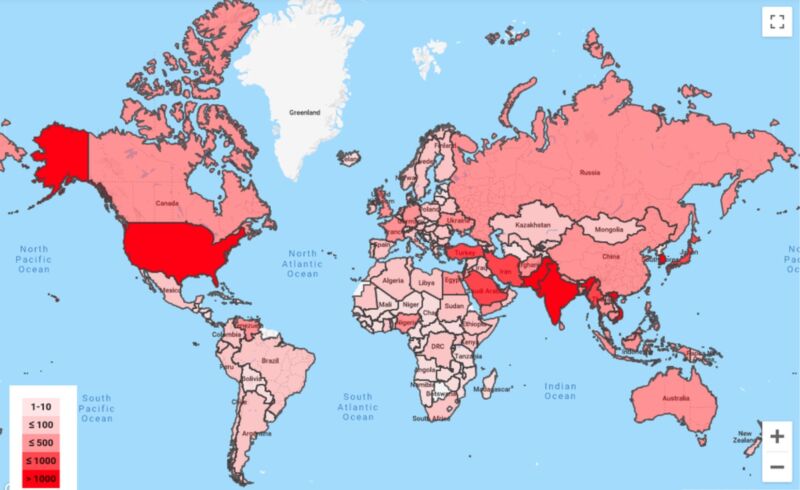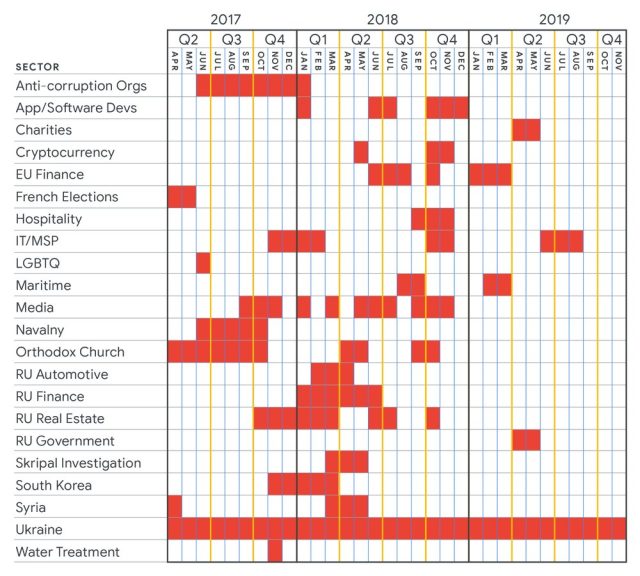The National Security Agency and the FBI are jointly exposing malware that they say Russian military hackers use in cyber-espionage operations.
Hackers working for Russia’s General Staff Main Intelligence Directorate’s 85th Main Special Service Center, military unit 26165, use the malware, which the Russians themselves call “Drovorub,” to target Linux systems, the NSA and FBI said Thursday in a detailed report.
The hackers, also known as APT28 or Fancy Bear, allegedly hacked the Democratic National Committee in 2016 and frequently target defense, government, and aerospace entities. The Russian military agency is also known as the GRU.

While the alert does not include specific details about Drovorub victims, U.S. officials did say they published the alert Thursday to raise awareness about state-sponsored Russian hacking and possible defense sector vulnerabilities. The disclosure comes just months before American voters will conduct a presidential election.
“Information in this Cybersecurity Advisory is being disclosed publicly to assist National Security System owners and the public to counter the capabilities of the GRU, an organization which continues to threaten the United States and U.S. allies as part of its rogue behavior, including their interference in the 2016 U.S. Presidential Election,” the NSA and FBI said in the report.
The U.S. intelligence community has assessed that multiple foreign governments may “seek to compromise our election infrastructure.” It was not clear if the Russian hackers were using Drovorub malware in any ongoing interference efforts related to the 2020 presidential elections.
The NSA and FBI urged national security personnel, including the U.S. Department of Defense, to be on the alert for Drovorub attacks.
“The malware represents a threat because Linux systems are used pervasively throughout National Security Systems, Department of Defense, and the Defense Industrial Base,” the statement said. “All stakeholders should take action as appropriate.”
The announcement comes nearly one year after the NSA stood up a new cybersecurity directorate aimed at sharing more adversary threat intelligence with the public, and in recent weeks the NSA has worked to expose a spate of Russian campaigns, including Russian hackers’ efforts to target coronavirus research.
Senior Vice President of Intelligence at CrowdStrike, Adam Meyers, told CyberScoop the release shows these hackers are not easily deterred.
“Most importantly it demonstrates that FANCY BEAR has more tools and capabilities that are still being identified. This actor didn’t pack up and go home, they still have tricks up their sleeve,” Meyers told CyberScoop, adding that the news should raise alarm bells about Linux security. “Another important take away is that Linux is an area that organizations need to keep in mind from a malware perspective, many have not invested in similar security tools for this platform as they have for user platforms.”
Attacks employing Drovorub may be linked with previous Russian military efforts against connected devices, according to the NSA and the FBI. An APT28 attack that Microsoft security researchers identified last year against devices such as an office printer or a VOIP phone, for instance, was linked with an IP address that has also been used to access the Drovorub command and control IP address, the NSA and FBI said.
In such attacks, the hackers appeared interested in exploiting so-called internet of things devices in order to gain access to broader networks, other insecure accounts, and sensitive data, according to Microsoft.
The joint NSA and FBI release also has the effect of alerting the Russian government that U.S. officials are capable of tracking some of their work. The 780th Military Intelligence Brigade, which currently works with the Pentagon’s offensive cyber arm, Cyber Command, tweeted information out about the malware, and tagged a state-funded media outlet, RT, to flag the news for them.
The Drovorub malware consists of several components, the NSA and the FBI said, including an implant, a kernel module rootlet, a file transfer tool, and an attacker-controlled command and control server.
“When deployed on a victim machine, the Drovorub implant (client) provides the capability for direct communications with actor-controlled C2 infrastructure; file download and upload capabilities; execution of arbitrary commands as ‘root’; and port forwarding of network traffic to other hosts on the network,” the NSA and FBI said.
More detail for zdnet:
“Technical details released today by the NSA and FBI on APT28’s Drovorub toolset are highly valuable to cyber defenders across the United States.”
To prevent attacks, the agency recommends that US organizations update any Linux system to a version running kernel version 3.7 or later, “in order to take full advantage of kernel signing enforcement,” a security feature that would prevent APT28 hackers from installing Drovorub’s rootkit.
The joint security alert [PDF] contains guidance for running Volatility, probing for file hiding behavior, Snort rules, and Yara rules — all helpful for deploying proper detection measures.
Some interesting details we gathered from the 45-page-long security alert:
- The name Drovorub is the name that APT28 uses for the malware, and not one assigned by the NSA or FBI.
- The name comes from drovo [дрово], which translates to “firewood”, or “wood” and rub [руб], which translates to “to fell”, or “to chop.”
- The FBI and NSA said they were able to link Drovorub to APT28 after the Russian hackers reused servers across different operations. For example, the two agencies claim Drovorub connected to a C&C server that was previously used in the past for APT28 operations targeting IoT devices in the spring of 2019. The IP address had been previously documented by Microsoft.








%2Fhttps%3A%2F%2Fwww.therecord.com%2Fcontent%2Fdam%2Fthestar%2Fnews%2Fworld%2Feurope%2F2020%2F07%2F16%2Fuk-us-canada-accuse-russia-of-hacking-virus-vaccine-trials%2FNY899-316_2020_173707.jpg&f=1&nofb=1)

